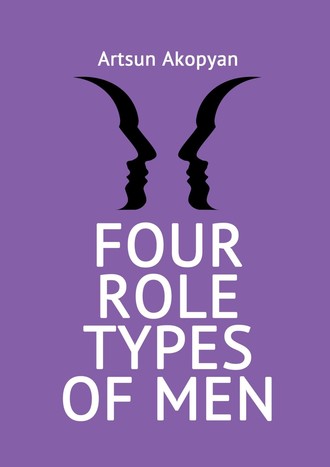
Полная версия
Four Role Types of Men

Four Role Types of Men
Artsun Akopyan
© Artsun Akopyan, 2025
ISBN 978-5-0050-7047-0
Created with Ridero smart publishing system
About the Book
The difference between typical male and female behavior is so big that the two genders seem to have come from different planets. Is this correct? Of course not. The truth is, a wrong social stereotype can lead you to serious problems in your personal relationships.
Behavior depends much more on temperament and educational background than gender. However, being aware of temperamental traits like “a choleric person gets angry very easily” and “a melancholic person is sensitive” is not enough to see through a man. You need to know what to expect from him in various situations at home and in public, and how to get along with him in the best possible way to ensure a long and healthy relationship.
The purpose of the book “Four Role Types of Men” is not only to help you explain some of your partner’s previous actions, but to foresee future actions as well – without any chiromancy, astrology or card-reading. Find out what you can do to change aspects of his behavior, and what cannot be changed in him no matter what you do. Learn how your relationship can benefit from his personal virtues, and how you can overcome his faults and weaknesses. In short, gain the knowledge you need to be happy with your chosen one.
About the author
Artsun Akopyan is a writer and freelance translator based in Russia. His publications include books for English language learners, short stories and novels, translations of fiction and nonfiction books from English into Russian, and applied psychology books.
Introduction
She fell in love – got married – gave birth to a baby – and got divorced…
About half of all women in the US and many other countries follow this same, unenviable path. What is the reason behind this unfortunate development? A standard reply to this question is “He and I were incompatible”. But what is the correct answer?
Misunderstanding. That is the root of all evil. What makes a loving man change for the worse only a couple of months or years after the wedding? What causes him to start raising his voice? What compels him to use violence? What is the reason behind his drinking and cheating?
For women that fail to find an answer to these questions, a corny phrase comes to mind: “All men are the same.” Or even a ruder version of the thought: “All men are trash”. Simple and clear. Is this popular wisdom correct?
No. This generalizing idea is quite wrong. Half of the population cannot simply be scum. You will never find deep and eternal love if you consider men to be worthless beings. On the other hand, by trying to reform a man by giving him lectures or going into hysterics, you might achieve the opposite effect, by convincing him that “all women are bitches”.
Who will benefit from this response? Only his secret lover, if he already has one. The cunning lady will try to prove that she is the exception to the rule, that she is an angel who came down from the sky especially for her man, and that there is no one like her on the earth.
Is this OK with you? If yes, you may stop reading. If not, let us look into the male psyche so that your union will not fall apart when tested by reality. We will start our analysis with a simple question: are all men really the same?
Chapter 1: All men are different
About half of the world’s population consists of men, and they are quite easy to distinguish from women. They have wider eyebrows, larger noes, thinner lips, and sharper chins.
And yet they are not molded to the same pattern. A man’s face can be distinguished not only from a female one, but also from another man’s, even if they belong to the same nationality. Representatives of the stronger sex also differ from each other in age, height, figure, hair color… In short, the appearance of men varies across the board, unless they are twins.
But perhaps the phrase “all men are the same” is true when it comes to behavior? No, there is no common standard for this factor either.
One man is an adventurer, another is a control freak.
One counts the change at a cashier’s desk carefully, another shoves it into his pocket without looking.
One chatters like a magpie, another prefers not to waste words.
One constantly violates the rules of the road, another does it accidentally for the first time in ten years (and probably receives a large fine).
One is a football fan, another is mad about philosophy, poetry, and Renaissance paintings.
One was kicked out of school because of academic failure, another received three different university diplomas and is fluent in five languages.
The list of examples is endless. The conclusion is unequivocal: each man behaves in his own way. Even twins who grew up in the same family act differently!
Maybe “all men are the same” when it comes to their attitude towards women? This is also incorrect!
Do you require examples? No problem!
There are men who believe in eternal love and devote poems to ladies. They are called hopeless romantics. There are others who believe in the power of money, and order women to their house by phone. They are considered cynics.
There are men who are submissive to their wives. They are nicknamed henpecked husbands. There are other husbands who only obey their dark desires. They are called petty tyrants.
There are those who reject marriage in principle. They are confirmed bachelors. There are those who marry several times in a row and never file for divorce. Those are polygamists.
What is the conclusion? Are all men so different that they have nothing in common?
As you know, there are no two people on earth with identical fingerprints, faces and skull shapes. The same applies to behavior. Nevertheless, we as humans strive to find out what standard the people around us belong to, and to categorize them into groups. Firstly, by gender, then, by age, height, shape, color, physical attractiveness, and behavior.
Why do we do this?
Because we as human-beings seek to understand whether a person is like us or different, attractive or not, dangerous or harmless.
Behavioral typing is important for us. It helps to understand what to expect from a person in various situations.
If you know that a man is a chatterbox, he will most likely prattle endlessly at the next meeting, which will not surprise you. But if he comes tight-lipped, something uncharacteristic of him, you should be wary. Is he ill or angry, or trying to hide something from you?
Uncharacteristic behavior is an alarm. It is a warning that you should keep your eyes open!
Conversely, if a person behaves as usual, you can relax. You know what to expect from them. If you understand the man correctly, chances are there will be no unpleasant surprises.
But what if you do not understand him well?
The consequences can be painful. You expect praise from the man, but find out he is irritated for an unknown reason. You may think that he is delighted with your new hairstyle, but then notice that he’s staring at your friend’s tattoo. You hope to enjoy a romantic evening with lots of hugs, but he ends up tinkering with his car in the garage until midnight, returning all covered up with black oil, a stench of which drowns out your new perfume. Great expectations do not coincide with reality. Who is to blame? You. Those were your expectations.
Wishful thinking leads to unfavorable outcomes. You invent a person’s identity and attribute it to your chosen person. After that, you wonder why his behavior seems so strange.
It is not strange at all. Your man behaves in accordance with his “role type’ derived from his temperament, upbringing, education and life experience. He interacts with the world in a way that is natural for him, not for you.
There are several types of men in terms of their interaction with the world. Therefore, guides like “How to keep a man attracted to you” can be useless, and sometimes even harmful. You cannot make everyone fit into the same pattern! What one likes leaves another indifferent and repels a third. The odor that attracted your first boyfriend can cause an allergic reaction in your second one!
To avoid painful quarrels, try to make out who your chosen one is. Separate features like “tall,” “broad-shouldered” and “clever” are not enough, you need to use a more nuanced approach.
How can you do this? How can you understand what “role type’ he is?
First, you need to figure out what role types there are. This will be discussed in the next chapter.
Chapter 2: Everyone has a role
Shakespeare once wrote, “All the world’s a stage, and all the men and women merely players.”
Actually, for the stage to function, other people besides the “players” are necessary. Someone has to write the script, someone needs to organize the sale of tickets, and of course there must be an audience to watch the performance. In total, we have four roles performing on the stage. Let us refer to them as the following:
– Scriptwriter;
– Director;
– Actor;
– Spectator.
Why four exactly?
Because they correspond to four types of temperament discovered by the ancient Greek physician Hippocrates and described by Galen, a Roman physician of Greek origin. The temperament types are well known: phlegmatic, sanguine, choleric, and melancholic. Each temperament behaves differently in society, and each subconsciously seeks to play the role that corresponds with their higher nervous activity type. In other words, the four stage characters are a social expression of temperaments, their manifestation in public life. Or, to put it even simpler, they are the role types.
Your man may not fully correspond to one of these temperaments, but the most important features will certainly coincide with your personality and disposition.
Let us see how these types differ from each other.
Scriptwriter
The Scriptwriter’s temperament type is phlegmatic.
The primary activity of the Scriptwriter is thinking. His approach to life can be described in the words of the Roman philosopher Cicero: “I am speaking of a clever and learned man, for whom to live is to think.”
The Scriptwriter can ponder on various problems from morning to night, and the need to interrupt this fascinating process for the night’s sleep makes him feel uneasy. As it is said in a famous song of a British rock band, “The Show Must Go On!” For the Scriptwriter, “The Show” is an endless stream of his own thoughts.
Waking up in the morning, he lies in bed with his eyes open, and looks at the ceiling. He doesn’t seem to care that the beautiful, intelligent, gentle woman lying next to him has also woken up, and that she would like to hear something like “Good morning, gorgeous! Did you sleep well?” She sighs, yawns, and stretches herself to attract his attention. No reaction! Is he cold-hearted?
Not at all. At this very moment, the turmoil of passions might be raging inside him: discontent, hope, despair, joy… What could cause this? Virtually anything!
For example, he may be worried by a change in the fur seals’ migration route, which he was told about in yesterday’s news. And it doesn’t matter that before the news release, he had no idea where the seals migrated, and whether they migrated at all. Information pops up in his head as soon as he wakes up. He is wondering what the reason was for this change in their lives, and begins looking for a solution. Where? In his own head, of course, using logic, his main tool for exploration of the world. And his emotions depend on how successful the process is!
If the Scriptwriter cannot make out why the seals changed their route, he is discontented. If he has a plausible assumption about the causes, such as Greenland snow melting, an oil spill in the ocean, or the impact of a meteorite, which was also mentioned in the newscast, he becomes more optimistic. If he considers his own solution correct and clever, he is filled with joy!
You may ask yourself why he cares about this. Is he a fool?
By no means, he is not. The Scriptwriter is not worried about the seals; he wants to get to the truth. He might just as well ponder on what tactics and strategy could lead Napoleon to victory in the Battle of Waterloo if he watched a relevant historical film the day before. Or perhaps, what are the chances for the Argentinian national football team to enter the America’s Cup playoffs this year. Or possibly the likelihood of scientists creating of an artificial spleen in an advanced medical lab by the beginning of the next decade…
What he will hardly think about is whether the ceiling that he is looking at requires whitewashing. The reason for this is that he does not actually see the ceiling. His mind’s eye is directed much farther. He analyzes events in the past, present and future, not the quality of the ceiling surface! Household chores are not in his sphere of interest.
However, there are exceptions.
For example, the Scriptwriter deals with household problems professionally, as for example, an interior or furniture designer. That is, he makes something new in the area. He invents and creates!
Another exception: the Scriptwriter perceives a domestic problem as a challenge to his mental abilities. For example, a switch socket he bought does not fit in the recess in a wall. How will he insert it? Is it better to redo the outlet or expand the recess? He can fiddle about with the socket for a few hours, but he will not regret the time spent if he succeeds.
The third possible exception is when he raises a routine task to the level of artwork. For example, instead of repairing a broken chair, he makes a new one, with carved legs and a special shaped seat. This might take him a month, but he will soon proudly ask a guest to sit on this masterpiece, and state, “Feel the difference”, and wait for praises of his talent.
Domestic chores are of interest to him only if he has to strain not only his muscles, but also his brain, and to do what he has never done before.
The Scriptwriter’s creative approach is evident in any sphere. Who else can he work as?
Perhaps an excellent accountant who can find the best and fastest way to make calculations and balance debit and credit? Or an outstanding programmer who can work alone to create a useful application for a smartphone, or in a large team to develop a new operating system? Or a valuable engineer who will surely identify the cause of an assembly line shutdown and come up with an effective means to fix the problem? Or a scientist dreaming of a Nobel Prize – and receiving it one day? Or a Scriptwriter in the literal sense of the word, that is, a person whose thoughts are embodied on a real stage by real actors!
Unfortunately, not all Scriptwriters achieve such impressive results. For some, the pinnacle of achievement is the self-made chair with carved legs.
This means that they directed their thinking in a wrong way. They gave too much thought to things that were irrelevant to them – such as migration of fur seals – and too little to the proper use of their talents. Or that they chose a wrong field of activity – for example, they obtained the position as a head of a programming team, only to cease writing code themselves. They should have taken into account that not everyone is born to be a Steve Jobs.
Before taking on the burden of responsibility for others, the Scriptwriter should ask himself, “Do I have leadership skills? Do I really want to be a boss?”
The Scriptwriter should remember that his advantage is the ability to analyze and create. Before diving into something else like directing a theater, playing on stage, or becoming a regular spectator, he needs to ask himself, “Why? Is it right for me?” An honest answer could be, “I don’t want to be a boss” or, “I don’t like performing on stage”, or, “It is not enough for me to watch other’s plays, I want to write one myself!”
So what’s the problem? Let him write or do other suitable work! He may not be a billionaire like Apple founder Steve Jobs or a movie star like Charlie Chaplin, but he will like his job, earning a decent income. This is much better than being under a constant stress in pursuit of other people’s goals!
What about love? Can the Scriptwriter develop deep feelings for a woman?
Oh yeah! He, like any other healthy man, has sexual desires inspired by nature. But he is not a primitive male who will act according to the principle “I came, I saw, I conquered.” He is an intellectual. And he does not simply react instinctively to the look and smell of a female, but tries to analyze and control his reaction.
How does he analyze and control it? First of all, he tries to find out if his sexual reaction is justified.
Imagine that you have a spectacular hairstyle and make-up, while also wearing your sexiest dress, stiletto heels and a diamond necklace. This will of course attract the Scriptwriter’ attention and make him admire your beauty. But do not rush to celebrate your victory. You are not a goddess in his opinion just yet. To become one, you must seem to be perfect to him in all respects, including the way you walk and laugh, and what you say and do.
In this regard, everything depends on what he considers to be an ideal woman. Can a “goddess” smoke? Is she allowed to drink wine, brandy, and vodka? May she use bad language? Must she be able to cook lasagna, write poetry, do the splits, dance hip-hop, sing a song in tune without a single false note? At last, does she treat him well enough?
The Scriptwriter will evaluate everything.
To truly fall in love, he needs to acknowledge you as Miss Perfection!
If the Scriptwriter finds some flaws in your character that seem to be incompatible with the status of a “goddess,” his feelings will conflict with his mind. Hormones urge him to make advances to you, but his brain begins to murmur in response, “She is a slob, she has a nasty laugh, she makes lots of errors in her messages, she does not respect me,” and the like.
If the Scriptwriter is not already head over heels in love with you, he will be able to subdue his passions, and leave you. Then he will look for another “goddess,” perhaps endlessly.
If his passion is too strong, he may give in to the onslaught of hormones and reveal his feelings to you. But what will happen next, when the hormonal storm ends and the infatuation passes? Will you be able to build a lasting relationship with him?
Everything will depend on how well you understand the character traits of each other and whether you both want to adapt to shortcomings.
The Scriptwriter can be a great life partner. He is not a leader, but he is able to get a good wage if he chooses the right profession to implement his creativity.
He is a responsible and reliable person who always strives to fulfill his promises.
He can do any work at home like repairing electrical sockets, gluing wallpaper on the walls or upholstering furniture, even if he has never done it before.
It is interesting to talk to him as he always has some fresh information from the most diverse areas – politics, economics, culture, sports, astronomy, which he does not mind sharing.
He is able to think logically and at the same time outside the box.
His patience and sense of humor will appease your tantrum and make you laugh.
He will select the best weight loss method for you, help you learn a foreign language, and forgive culinary mistakes.
The Scriptwriter is an attentive and romantic lover, and gives sex exclusively for love.
The Scriptwriter has a good set of qualities, and your task is to use this set properly!
Director
The Director’s temperament type is sanguine.
The purpose of the Director’s life is making life comfortable.
You will forget about warped window frames, sticking of a front door lock and a leaking tap in the bathroom. He will fix everything. To do this, he always has all the required tools in a special case: a hammer, a screwdriver, an adjustable wrench, and whatnot.
The director has a high opinion of himself, maintains his dignity, and is always well dressed – he can wear stylish white clothes even at home.
He never talks nonsense. If he is not familiar with a topic, he would rather stay silent.
In a professional field, this type does not necessarily become the director of an organization, but he certainly performs some functions associated with management or control. He can be a chief accountant, a personnel department head, a restaurant chef, an auditor, a crew foreman, a luggage room manager…
Whoever this man is by training and position, he probably understands something related to building construction, car repair, and banking operations – at least to the extent that no one could cheat him in these important spheres of life.
The Director behaves the way he does because he wants to live in decent conditions, to drive without breakdowns or accidents, and to have financial reserves!
If you’re married to such a person, congratulations! Financial problems are unlikely to bother you. However, you may hear about them all the time from your husband – the Director.
The Director is usually impressed by grand-looking people riding in expensive cars, especially if they have bodyguards around them. This can be used by swindlers. Fake businessmen or state officials can pull the wool over his eyes so that he will agree to give them a large sum of money in exchange for a lucrative contract or a high position in the city administration. The more brazen the lie, the more credible it seems to be to him!
Why? The Director’s weak point is poorly developed intuition. He is not used to digging into his own emotions or scrutinizing other people’s ideas. He has no free time for that! The man is too busy to pay attention to someone’s facial expressions, gestures and intonation. Other people are important to him from the functional point of view, as they help or hamper in achieving his goals. If their actions seem to be logical and useful to him, he is eager to cooperate. He does not feel that he might be fooled! However, to achieve success, the swindlers must be experts in their field, because the Director has a habit of rechecking any information. He sorts out data much better than emotions!
His health comes first. Nobody likes to be ill, but the Director considers any illness a big inconvenience, because he not only has to incur additional expenses for treatment, but also has to change his work plans. It depresses him even more than high temperature. Therefore, he tries to avoid diseases by eating healthy food and doing sports regularly.
The Director only pays attention to practical information that is useful not for the world in general, but personally for him, his family and work.
Unlike the Scriptwriter, he will not think over the migration of seals, discovery of new galaxies, breakthroughs in robotics or elections in Venezuela if all of this has no direct connection with his life.
But he will definitely watch the South American Football Championship if his boss is interested in football. This will allow him to make small talk with the man during his lunch break. He remembers very well that friendship with the boss is a prerequisite for a successful career!
What about a relationship with a woman?
At first, the Director may seem to be a bright, friendly and generous person who can do many impulsive things to attract your attention, and even risk his life for no actual reason. That is a wrong impression. He just knows how lovers behave. He read about it in books, saw it in movies and on TV. He does what he must, in his estimation, to meet a woman’s expectations.
The Director has real passions, but they do not make him irrational. He just lets himself express his feelings when he considers it appropriate. He is willing to pay a high price for the happiness of being with you – but not too high.
Yes, he can send you a great bouquet of roses, but only for a reasonable price. He will never sell his house to buy a yacht if living in a yacht is your dream, not his.









